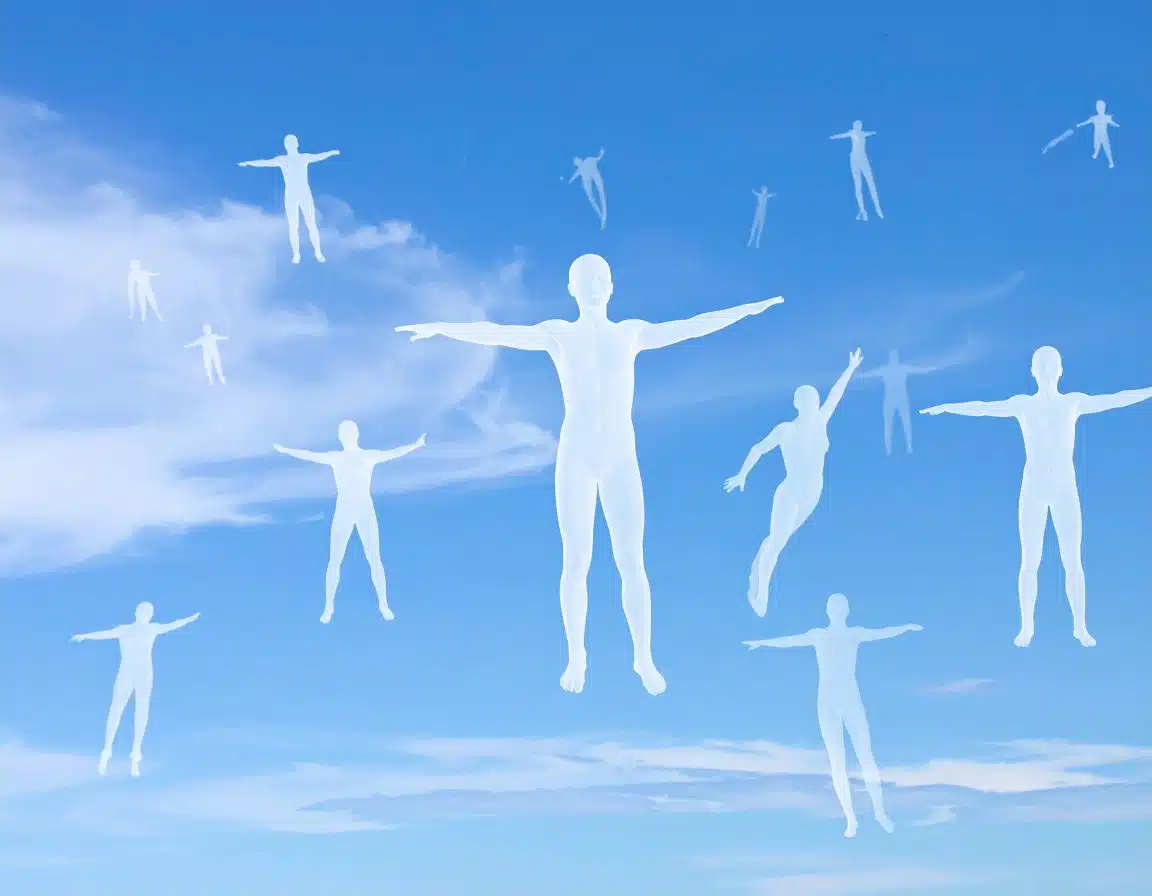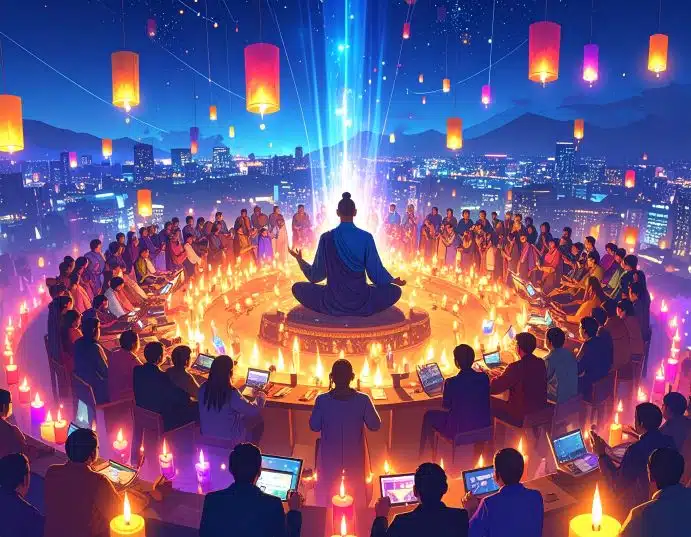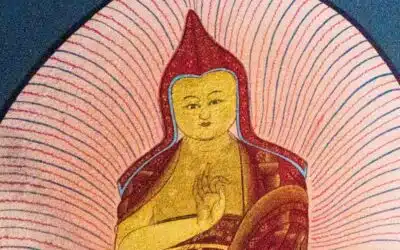The Five Degenerations – part 2

Written By Paul Baffier
Blog | History of Dzogchen | Reflections on life | The Dzogchen basics
Let’s continue our apocalyptic journey with Paul through that classic theme of Indo-Tibetan tradition, the “Five Degenerations”.
Series: Difficult conditions in Dzogchen
The Five Degenerations – part 2
Let’s continue our apocalyptic journey through this classic theme of the Indo-Tibetan tradition, the “five degenerations”.
We covered the first two (lifespan and time) in a previous article (inspired by the Universal Monarch Sutra, which, as you may have noticed, deals with the cascading effects of the five degenerations)
This leaves passions (nyon mongs), beings (sems can) and view (lta ba).
Passions (nyon mongs)
Passions or afflictions (anger-aversion, desire-attachment, ignorance to which we can add pride and jealousy) have probably always existed: they are basic tendencies of human beings and sentient beings in general: I like, I don’t like, I don’t know. They are the groundswell that pushes us from action to action, from thought to thought, from illusory choice to illusory choice.
But when the tradition says that these five dynamics of existence are “degenerating” in our time, it means that they are becoming so crazy, so intense, as disturbing factors. And they disturb nothing but our minds, which no longer know how to settle down or calm down.
“When tradition speaks of the “degeneration of beings” (Sanskrit: sattva kaṣāya), it refers to the decline of physical form (as the years go by, human beings will become smaller and smaller, more and more fragile, and less and less skilled) and of cognitive capacities, i.e. the ability to reason, to clarify and to formulate a thought that is articulate, coherent and appropriate to the situations experienced.”
The sociologist Hartmut Rosa (Acceleration: a social critique of time, 2013) has clearly shown that the main experience of modernity is that of acceleration: media acceleration, technological acceleration, acceleration of social transformations, and thus acceleration of the pace of life. And now everyone is familiar with the universal experience of stress, lack of time, chronic fatigue and latent burnout. And the intimate, nihilistic dissolution of expectations, the pending disappearance of common points of reference and the constant pulsation of the feeling of powerlessness…
In this anxiety-inducing and gaslighting atmosphere, pro-social qualities such as non-attachment (ma chags pa) and non-irritation (zhe ldang med pa) decrease, while withdrawal, sudden mood swings and irrational actions increase. In short, we experience chaotic emotional jolts like electric shocks.
Beings (sems can)
When tradition speaks of the “degeneration of beings” (Sanskrit: sattva kaṣāya), it refers to the decline of physical form (as the years go by, human beings will become smaller and smaller, more and more fragile, and less and less skilled) and of cognitive capacities, i.e. the ability to reason, to clarify and to formulate a thought that is articulate, coherent and appropriate to the situations experienced.
Tainted by violent anger and desire, intelligence diminishes and darkens, so much so that it comes to neglect the supports on which it once relied: haven’t we indeed passed from oral cultures, where the life of intelligence was based on memory and mnemonics, to a culture of the written word, where books, wisely stored in libraries outside ourselves, have replaced the perennial vivacity of our minds? And aren’t we now moving into a different cultural paradigm with AI? One in which all human knowledge seems to be (illusorily) contained in an (”eternal”) machine that we need only to interrogate? In other words, to the illusion that the mind is located outside ourselves, in an automatic process, detached from any effort on our part.
Whether or not this will actually happen, only the near future will tell… But certain science fiction writers, always at the forefront of the field, have thought about the matter and have turned it into the passably comic movie Idiocracy, in which a man of average intelligence, projected into the year 2500, proves to be a genius when confronted with a humanity that has forgotten the basics of all knowledge, first and foremost agriculture and medicine. A fun and horrifying movie… that makes you think…
View (lta ba)
Tradition speaks of “view” in the same way that we speak of “point of view” or perception of reality: in other words, it’s not just a question of the more or less constructed opinion we have of things as a result of various cultural experiences, but also of the more or less spontaneous perception we have of them. The view, i.e. the vision (of “reality”) that we believe to be genuine and free of ulterior motives, when in fact it is the fruit of numerous chains of conditioning.
From the perspective of Dzogchen, however, there are views that present the primordial basis of all reality, and the learning processes that enable us to experience it directly; and there are also views that describe in minute detail the endlessly conditioned-conditioning phenomena, always renewed, forever endless in their emergence, forever endless in their disappearance.
Therefore, from the perspective of practicing the basics of Dzogchen, there are experiences of genuine views (yang dag pa’i lta ba) that lead to liberation from all conditioning, and from all the extreme views that continually plunge us into a waking dream, an illusory reality sustained by the eternal rumbling of thoughts, one after another. These views are called “extreme” because they make us oscillate between believing in the permanence (rtag pa’i mtha’) of phenomena and believing in the non-permanence (chad mtha’) of phenomena. This is much more a way of directly perceiving reality rather than thinking about it. So these views are therefore less philosophies than ways of life… And… did you guess? Genuine views seem to be disappearing in our time, while extreme views…
Should we save the hope of a happy ending in a cyclical system that endlessly folds and unfolds degenerations and regenerations? The primordial basis of all reality is devoid of the duality of happiness and unhappiness, and this is what Dzogchen teaches again and again.
More Posts
Being Your Own Master
Relationship with a master requires discernment. “Being your own master” offers insights into understanding devotion and avoiding pitfalls.
Phenomena
"Phenomena" is the second entry in a new category designed to improve understanding of essential Dzogchen words and concepts.
The Story of the First Masters: Manjushrimitra
We continue the Stories of the First Dzogchen Masters with Manjushrimitra, who structured the verses of Dzogchen into three series.





